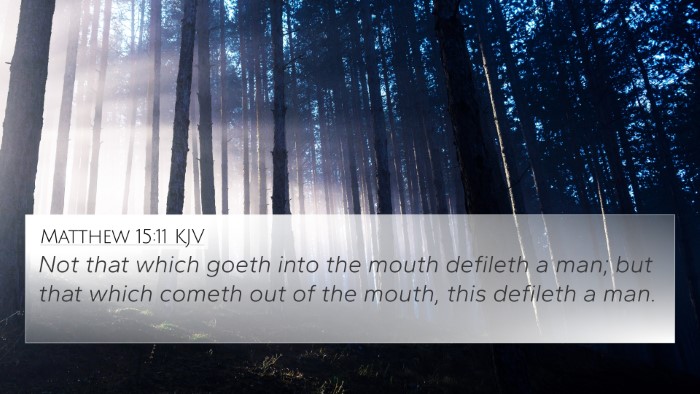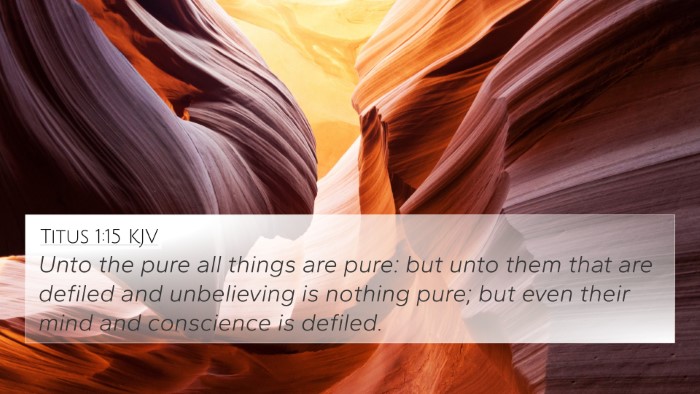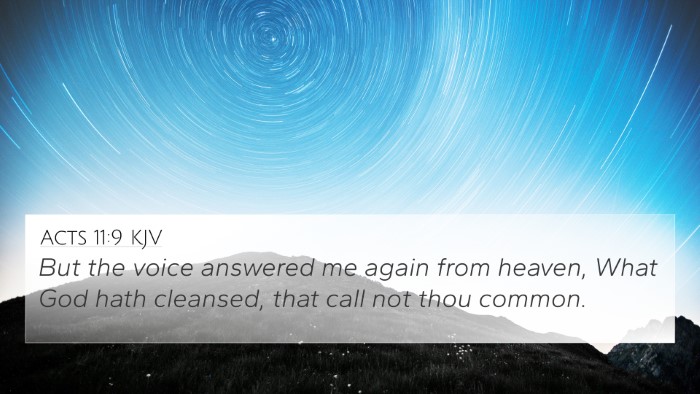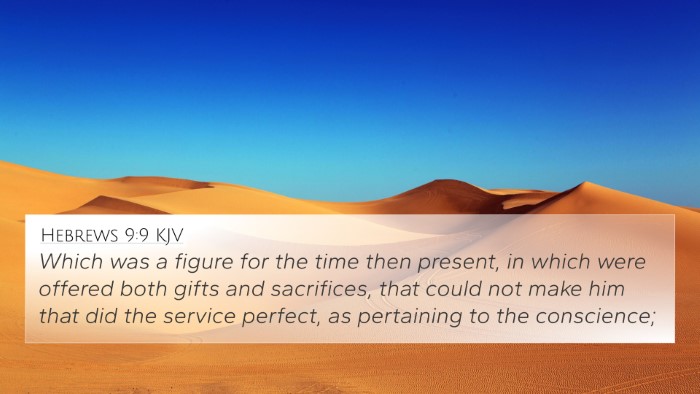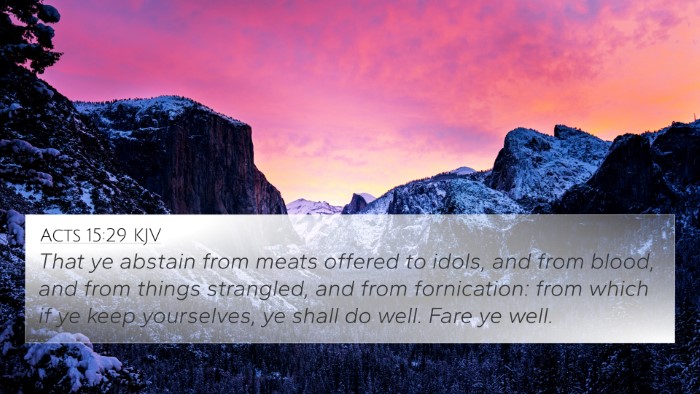Understanding Acts 10:15
Acts 10:15 states: "And the voice spake unto him again the second time, What God hath cleansed, that call not thou common."
This verse occurs in the context of Peter's vision, which marks a pivotal moment in the early church's understanding of the inclusion of Gentiles into the Christian faith.
Commentary Summary
Matthew Henry's Commentary: Matthew Henry emphasizes that this vision is a divine declaration of the abolition of ceremonial distinctions made by the Jewish law. He notes that God cleansed the Gentiles as well as the Jews, and thus, any barrier created by the law should no longer be observed. The interjection, "What God hath cleansed," signifies God's sovereign action in embracing all who believe.
Albert Barnes' Notes: Barnes elaborates that the voice reiterates the message to Peter, emphasizing that God's viewpoint on cleanliness and acceptability transcends human traditions and prejudices. He points out that this instruction was crucial as it laid the groundwork for opening the door of faith to the Gentiles, which was a revolutionary change in the early church.
Adam Clarke's Commentary: Clarke comments on the significance of the phrase "that call not thou common," interpreting it as a call to alter previously held convictions regarding what was deemed unclean or common. He suggests that this verse highlights God’s intent to remove divisions among His people, framing a crucial theological shift towards inclusivity.
Theological Significance
This verse encapsulates several key themes in the New Testament, including:
- Grace over Law: It signifies the transition from the law that separated the Jews from the Gentiles to the grace that includes all believers.
- God's Sovereignty: The verse emphasizes God's authority to redefine what is holy and acceptable.
- Unity in Diversity: It points to a vision of a united church that transcends ethnic and cultural barriers.
Bible Verse Cross-References
Acts 10:15 can be connected to several other passages that reflect similar themes of inclusion and divine cleansing:
- Romans 10:12: "For there is no difference between the Jew and the Gentile—the same Lord is Lord of all and richly blesses all who call on him."
- Galatians 3:28: "There is neither Jew nor Gentile, neither slave nor free, nor is there male and female, for you are all one in Christ Jesus."
- 1 Timothy 4:4-5: "For everything God created is good, and nothing is to be rejected if it is received with thanksgiving, because it is consecrated by the word of God and prayer."
- John 3:16: "For God so loved the world that he gave his one and only Son, that whoever believes in him shall not perish but have eternal life."
- Acts 15:9: "He did not discriminate between us and them, for he purified their hearts by faith."
- Mark 7:19: "For it doesn’t go into their heart but into their stomach, and then out of the body.” (In saying this, Jesus declared all foods clean.)
- Hebrews 10:14: "For by one sacrifice he has made perfect forever those who are being made holy."
Connections Between Bible Verses
Understanding the connections between these verses provides a broader context of God's intent for His followers:
- The instruction in Acts 10:15 helps illuminate the unity articulated in Galatians 3:28.
- Romans 10:12 echoes the sentiment of inclusivity that Peter learns through his vision.
- John 3:16 shows the global scope of God's love, reinforcing the message in Acts.
- Mark 7:19 and Acts both address the issue of what is clean and unclean according to God’s standards.
- The implications of Acts 10:15, as seen in Acts 15, underline the ongoing dialogue about faith and law in the early church.
Why Cross-Referencing is Vital
Cross-referencing Biblical texts serves multiple purposes:
- Contextual Understanding: It aids in diving deeper into the original meanings and applications of verses.
- Holistic Interpretation: It encourages readers to view the Bible as an interconnected whole rather than isolated snippets.
- Thematic Connections: By seeing themes across various books, readers can grasp the overarching narrative of Scripture.
- Facilitating Study: Cross-reference systems enhance study sessions, making it easier to locate related passages and concepts.
Conclusion
Acts 10:15 stands as a vital moment in the Scriptures, addressing the profound theme of God’s grace. Its important message teaches believers about inclusivity and the removal of barriers within the faith community. Understanding and utilizing Bible verse cross-references is essential for deepening one's spiritual insight and fostering a more significant connection to the Biblical narrative.
By employing tools for Bible cross-referencing, individuals can enrich their study and gain a better grasp of how seemingly disparate verses interrelate thematically and theologically.




